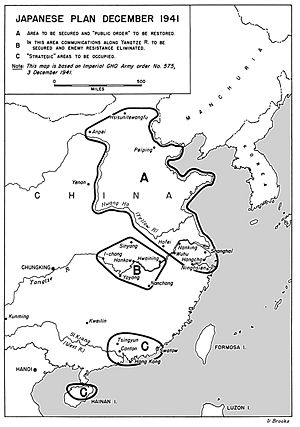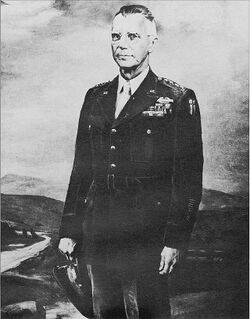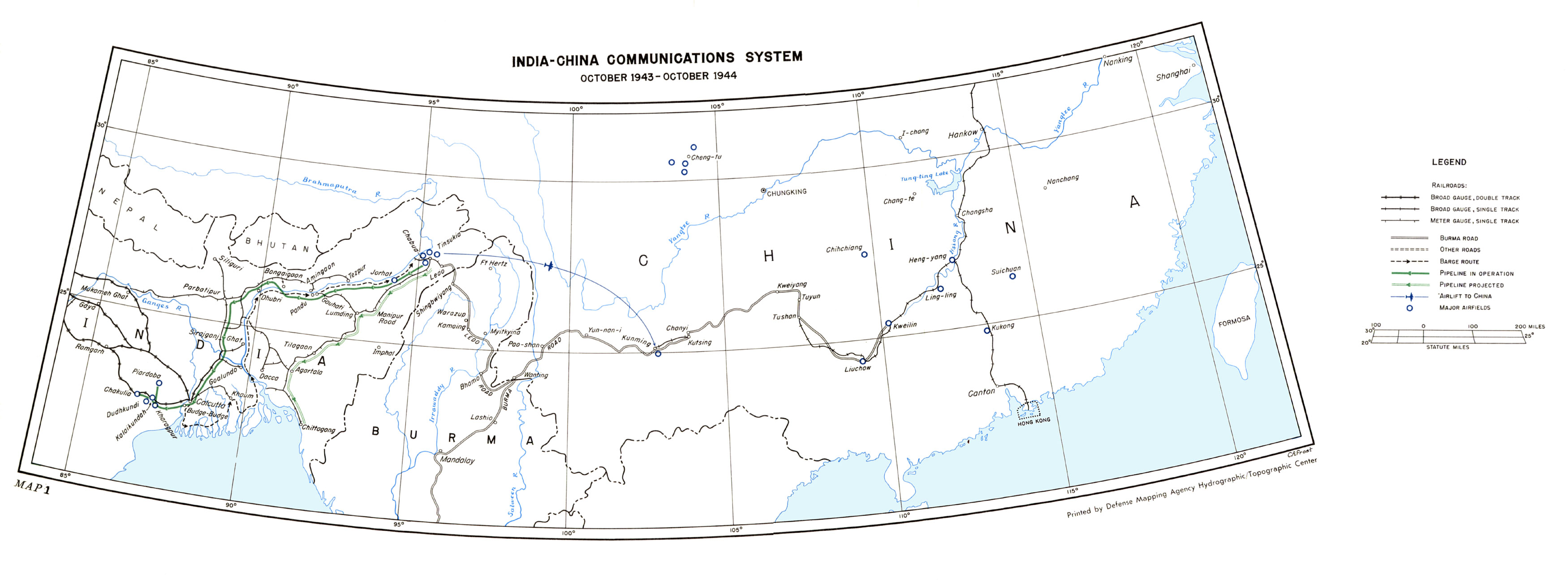Joseph Warren Stilwell: Difference between revisions
imported>Richard Jensen mNo edit summary |
imported>Richard Jensen (add details pre 1942) |
||
| Line 2: | Line 2: | ||
'''Joseph Warren Stilwell''' (1883 - 1946), was a senior American general in [[World War II]] as commander of American forces in the China-Burma-India theater, commander of the main Chinese armies in Burma, (1942-44) with four-star rank, and, as commander in the late stages of the [[Okinawa, battle of|battle of Okinawa]] in 1945. He was scheduled to lead the invasion of Japan when the war suddenly ended. "Vinegar Joe" was notoriously difficult to work with, especially in a role in China that was primarily diplomatic. A fighting general who spoke Chinese and knew the villages well, he possessed a fierce integrity, and a hatred of incompetence and pretentiousness, but was sometimes devious and secretive. | '''Joseph Warren Stilwell''' (1883 - 1946), was a senior American general in [[World War II]] as commander of American forces in the China-Burma-India theater, commander of the main Chinese armies in Burma, (1942-44) with four-star rank, and, as commander in the late stages of the [[Okinawa, battle of|battle of Okinawa]] in 1945. He was scheduled to lead the invasion of Japan when the war suddenly ended. "Vinegar Joe" was notoriously difficult to work with, especially in a role in China that was primarily diplomatic. A fighting general who spoke Chinese and knew the villages well, he possessed a fierce integrity, and a hatred of incompetence and pretentiousness, but was sometimes devious and secretive. | ||
==Career== | ==Career== | ||
He was born in Palatka, Florida, where his wealthy parents were vacationing, and brought up in New York City. Both bookish and athletic, he was headed for Yale until his pranksterism caused his father to send him to West Point to be straightened out. Stilwell was graduated from West Point in 1904, and eagerly made a career in the Army. After service in the Philippines he was an intelligence officer (G-2) in the [[American Expeditionary Forces]] in France during World War I. | He was born in Palatka, Florida, where his wealthy parents were vacationing, and brought up in New York City. Both bookish and athletic, he was headed for Yale until his pranksterism caused his father to send him to West Point to be straightened out. Stilwell was graduated from West Point in 1904, and eagerly made a career in the Army. Stilwell spent years at West Point teaching French and Spanish, tactics, English, and history. He also coached basketball and football and was promoted to captain in 1916. In 1910 he married Winifred Alison Smith; they had five children. After service in the Philippines he was an intelligence officer (G-2) in the [[American Expeditionary Forces]] in France during World War I, playing a major role in organizing G-2 operations for the [[American Expeditionary Forces|American offensive]] at Saint-Mihiel. | ||
==China== | |||
Stilwell, already noted for his language skills, became the army's first language officer in China, with service in Beijing (1920-1923), where he learned to speak Chinese. He helped the International Famine Relief Committee of the Red Cross as chief engineer on road-building projects in Shensi and Shansi provinces. There he lived and worked in the field with Chinese laborers and village officials, marched with the warlord armies, and came to know a China far beyond the foreigner's usual ken. His immense curiosity and powers of observation found expression, then and later, in his diary, where he recorded his impressions in vivid and voluminous detail. | |||
After attending the army's Infantry school at Ft. Benning and and the Command and General Staff school at Fort Leavenworth, Stilwell returned to China (1926-1929) as battalion commander and later executive officer of the Fifteenth Infantry an American regiment stationed in Tientsin as a result of the Boxer Rebellion. He watched the [[KMT|Kuomintang]] under [[Chiang Kai-shek]] unify the nation, assessing Chinese affairs a series of weekly articles for the journal of the Fifteenth Infantry. His third China duty came in 1935-1939, when he returned as military attaché to observe, judge, and report the Japanese invasion, which began in 1937 and soon captured the major cities. Stilwell formed a negative opinion of KMT leadership and came to belive that Chinese soldiers, so hopelessly weak, ill-armed and poorly led in the war with Japan, could some day become the equal of any in the world, if they were properly led, trained, nourished, and equipped. | |||
From 1929 to 1933, Stilwell served as chief of the tactical section at the Infantry School, under the direction of Col. [[George C. Marshall]]. Marshall had high praise for Stilwell as "a genius for instruction," who was "ahead of his time in tactics and technique," and, although personally unassuming, was one of the "exceptionally brilliant and cultured men of the army."<ref> Barbara Wertheim Tuchman, ''Stilwell and the American Experience in China, 1911-45'' (1970) [http://books.google.com/books?id=cmGWftWcnL4C&pg=PA125&lpg=PA125&dq=%22exceptionally+brilliant+and+cultured+men+of+the+army%22&source=web&ots=nc0ZTCXnHd&sig=5QCySrbhYCCnss35-30JTHTMK8o&hl=en&sa=X&oi=book_result&resnum=1&ct=result online p.125]</ref> Stilwell was instantly repelled by incompetence or pretentiousness. A man of utter integrity, he was a fighter and a doer, whose too-quick disgust for anything less in others made him at times, as Marshall later said, "his own worst enemy."<ref> Tuchman, ''Stilmann,'' [http://books.google.com/books?id=cmGWftWcnL4C&pg=PA425&vq=%22worst+enemy%22&dq=%22exceptionally+brilliant+and+cultured+men+of+the+army%22&source=gbs_search_s&sig=ACfU3U3clQ1j8FouWoHL3flvbkSx3xRRXw p. 425 online]</ref> His unsparing and acid critiques earned him the nickname "Vinegar Joe." | |||
Martshall promoted his career and by late 1941, Stilwell had commanded the Third Infantry Brigade (1939), the Seventh Division (1940), and the III Corps (1940-1941) and had been promoted to major general (1940). By virtue of his training of troops and his mastery of tactics in troop maneuvers, he was rated the army's best corps commander. After Pearl Harbor Marshall brought him to Washington to command GYMNAST, a planned landing in North Africa, but that operation was postponed. | |||
==World War II== | ==World War II== | ||
[[Image:Cbi-1941.jpg|thumb|300px|Japan's plans to control key areas of China, 1941; Japan already held Manchuria as the puppet state of [[Manchukuo]]]] | [[Image:Cbi-1941.jpg|thumb|300px|Japan's plans to control key areas of China, 1941; Japan already held Manchuria as the puppet state of [[Manchukuo]]]] | ||
Revision as of 00:27, 1 July 2008
Joseph Warren Stilwell (1883 - 1946), was a senior American general in World War II as commander of American forces in the China-Burma-India theater, commander of the main Chinese armies in Burma, (1942-44) with four-star rank, and, as commander in the late stages of the battle of Okinawa in 1945. He was scheduled to lead the invasion of Japan when the war suddenly ended. "Vinegar Joe" was notoriously difficult to work with, especially in a role in China that was primarily diplomatic. A fighting general who spoke Chinese and knew the villages well, he possessed a fierce integrity, and a hatred of incompetence and pretentiousness, but was sometimes devious and secretive.
Career
He was born in Palatka, Florida, where his wealthy parents were vacationing, and brought up in New York City. Both bookish and athletic, he was headed for Yale until his pranksterism caused his father to send him to West Point to be straightened out. Stilwell was graduated from West Point in 1904, and eagerly made a career in the Army. Stilwell spent years at West Point teaching French and Spanish, tactics, English, and history. He also coached basketball and football and was promoted to captain in 1916. In 1910 he married Winifred Alison Smith; they had five children. After service in the Philippines he was an intelligence officer (G-2) in the American Expeditionary Forces in France during World War I, playing a major role in organizing G-2 operations for the American offensive at Saint-Mihiel.
China
Stilwell, already noted for his language skills, became the army's first language officer in China, with service in Beijing (1920-1923), where he learned to speak Chinese. He helped the International Famine Relief Committee of the Red Cross as chief engineer on road-building projects in Shensi and Shansi provinces. There he lived and worked in the field with Chinese laborers and village officials, marched with the warlord armies, and came to know a China far beyond the foreigner's usual ken. His immense curiosity and powers of observation found expression, then and later, in his diary, where he recorded his impressions in vivid and voluminous detail.
After attending the army's Infantry school at Ft. Benning and and the Command and General Staff school at Fort Leavenworth, Stilwell returned to China (1926-1929) as battalion commander and later executive officer of the Fifteenth Infantry an American regiment stationed in Tientsin as a result of the Boxer Rebellion. He watched the Kuomintang under Chiang Kai-shek unify the nation, assessing Chinese affairs a series of weekly articles for the journal of the Fifteenth Infantry. His third China duty came in 1935-1939, when he returned as military attaché to observe, judge, and report the Japanese invasion, which began in 1937 and soon captured the major cities. Stilwell formed a negative opinion of KMT leadership and came to belive that Chinese soldiers, so hopelessly weak, ill-armed and poorly led in the war with Japan, could some day become the equal of any in the world, if they were properly led, trained, nourished, and equipped.
From 1929 to 1933, Stilwell served as chief of the tactical section at the Infantry School, under the direction of Col. George C. Marshall. Marshall had high praise for Stilwell as "a genius for instruction," who was "ahead of his time in tactics and technique," and, although personally unassuming, was one of the "exceptionally brilliant and cultured men of the army."[1] Stilwell was instantly repelled by incompetence or pretentiousness. A man of utter integrity, he was a fighter and a doer, whose too-quick disgust for anything less in others made him at times, as Marshall later said, "his own worst enemy."[2] His unsparing and acid critiques earned him the nickname "Vinegar Joe."
Martshall promoted his career and by late 1941, Stilwell had commanded the Third Infantry Brigade (1939), the Seventh Division (1940), and the III Corps (1940-1941) and had been promoted to major general (1940). By virtue of his training of troops and his mastery of tactics in troop maneuvers, he was rated the army's best corps commander. After Pearl Harbor Marshall brought him to Washington to command GYMNAST, a planned landing in North Africa, but that operation was postponed.
World War II

Ledo Road
Bibliography
- Anders Leslie. The Ledo Road: General Joseph W. Stilwell's Highway to China. (1965).
- Bidwell, Shelford. The Chindit War: Stilwell, Wingate, and the Campaign in Burma, 1944. (1979)
- Byrd Martha. Chennault: Giving Wings to the Tiger. (1987).
- Dod Karl C. The Corps of Engineers: The War against Japan. (1966),
- Liang, Chin-Tun. Gen. Stilwell in China, 1942-1944 (1972), a pro-Chiang view
- Newell, Clayton R.‘’Burma, 1942'’ online edition, focus on Stilwell’s operations
- Romanus, Charles F. and Riley Sunderland. Stilwell's Mission to China (1953), official U.S. Army history online edition
- Romanus, Charles F. and Riley Sunderland. Stilwell's Command Problems (1956) online edition
- Schaller Michael. The U.S. Crusade in China, 1938-1945. (1979). online edition
- Tuchman, Barbara. Stilwell and the American Experience in China, 1911-45, (1972), 624pp; Pulitzer prize (The British edition is ttiled Against the Wind: Stilwell and the American Experience in China 1911-45,) excerpt and text search
- Ven, Hans Van De. "Stilwell in the Stocks: the Chinese Nationalists and the Allied Powers in the Second World War." Asian Affairs 2003 34(3): 243-259. Issn: 0306-8374 Fulltext: Ebsco, revisionist argument that Stilwell was incompetent, had no command training or experience, and did not appreciate air power. Ven suggests that Roosevelt's needs in the presidential election of 1944, the strategic decision to defeat the Nazi menace in Europe before giving full attention to Japan, and the unwise yielding to the needs of the Soviet Union during World War II all led to the defeat of the Chinese Nationalists.
- Ven, Hans van de. War and Nationalism in China: 1925-1945 (2003), negative on Stilwell
- Young, Kenneth Ray. "The Stilwell Controversy: A Bibliographical Review," Military Affairs, Vol. 39, No. 2 (Apr., 1975), pp. 66-68 in JSTOR
Primary Sources
- Stilwell, Joseph Warren. The Stilwell papers edited by Theodore H. White, (1958).
See also
Online resources
notes
- ↑ Barbara Wertheim Tuchman, Stilwell and the American Experience in China, 1911-45 (1970) online p.125
- ↑ Tuchman, Stilmann, p. 425 online

